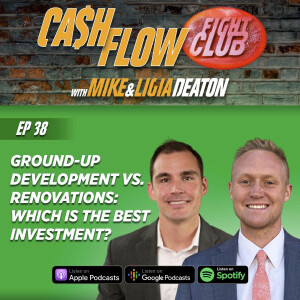
Wednesday Mar 27, 2024
E38: Ground-Up Development vs. Renovations: Which Is the Best Investment?
In this episode, real estate investors Brandon Cobb and Alec Beardhall go head-to-head to compare the alternative investment opportunities of land development versus multifamily real estate. Brandon highlights the flexibility and multiple exit options of land investing whereas Alec notes the tax benefits and passive income potential of multifamily deals.
Hear how Brandon forces value through rezoning vacant parcels while Alec increases rents and occupancy on apartment complexes. Get the inside scoop on these alternative investment strategies and learn which model comes out on top.
Here are some power takeaways from today’s conversation:
00:00
02:23 - Brandon and Alec’s backgrounds
10:14 - How apartment syndication works
14:29 - Four strategies for forcing land value growth
19:00 - The benefits of pre-selling developed land
22:32 - Ways to find their best deals
25:30 - Benefits: Land investing vs. multifamily investing
39:00 - The importance of investor experience
41:37 - Multifamily and development operations and investor communications
Episode Highlights:
[10:16] How Apartment Syndication Works
Alec explains how High Country Capital Partners does apartment syndication: they bring their own capital plus investor funds to purchase large apartment complexes. This allows individual investors to own real estate without hassles. They focus on "light value add" deals from 50-480 units, typically from 1980-2010. Investors receive 7-10% annual cash flow plus an equity payout when the property is later sold/refinanced.
[14:29] Four Strategies for Forcing Land Value Growth
Brandon outlines four ways to force appreciation in vacant land and extract value:
- Force-depreciate the value of the land through entitlements like rezoning, then sell it to another developer for a profit.
- Get the land entitled with utilities/infrastructure in place, then contract and pre-sell it to an end buyer who provides a down payment to fund development.
- Develop the land yourself by building homes or commercial properties to sell.
- Develop it and hold it as a build-to-rent community, using a multifamily-style business model to generate ongoing rental income.
[25:30] The Benefits of Land Investing
- Flexibility with multiple exit strategies like reselling to another developer or building and selling homes individually. This provides more options than renting out an apartment complex long-term.
- Forced appreciation locks in land value upfront before purchasing. This protects investors from market forces that could impact a multifamily property, like rising interest rates.
- Investors can control 100% of the investment with no debt until development begins. This allows projects to be paused if needed rather than relying on bank financing.
- Land value is secured through entitlements and engineering work done ahead of time by the sponsor. This de-risks the investment compared to taking on a multifamily property requiring renovations.
[30:27] The Benefits of Multifamily Investing
Alec highlights two main benefits of investing in multifamily real estate:
Cashflow: Investors receive a passive, recurring return of 6-8% through quarterly distributions. This provides ongoing income without needing to actively manage the property.
Tax benefits: Large tax breaks are available through depreciation deductions and cost segregation studies. These can help offset other sources of income for investors. The government incentivizes multifamily investing through these tax advantages.
Resources Mentioned:
Alec Beardall and Multifamily Investing: High Country Capital Partners
Brandon Cobb: HBG Capital
For a free e-book: Education Recourses - HBG Capital
No comments yet. Be the first to say something!